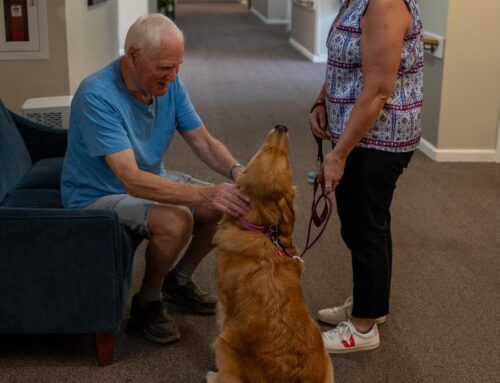The age-old saying of “A dog is a man’s best friend” has found its true application in recent times.
Our furry mates have always been the most loved members of the family. They give equal or more love as we give them and drive profound psychological benefits to improve our wellbeing.
Of late, the idea of channeling the power of these small four-legged creatures to check stress and anxiety is getting a lot of attention, all for good reasons. Therapy dogs are now trusted as ‘healing companions’ that provide love, affection, and comfort to people with physical ailments, stress, and other mental health problems. Several patients with issues of depression, bipolar disorder, autism, and post-traumatic stress disorders have responded positively to the therapy dog treatments. In fact, there is enough evidence that proves that therapy dogs have been able to transform the lives of people in hospitals, old age homes, and schools.
Today, we have tried to narrow down a small list of lesser-known venues where the therapy dog treatment can prove to be a significant breakthrough; have a read –
Public Libraries
A library is deemed to be the safest haven for all those who thrive on knowledge and want to make a difference by syncing their thoughts and actions.
Many people have found their second home in large public libraries. They spend a lot of time there to soak everything that can benefit/entertain them in one way or another. This often gets exhausting and overwhelming, and this is where therapy dogs can play a vital role in rejuvenating the mood of book lovers.
Interacting with therapy dogs releases mood-boosting hormones oxytocin and dopamine that checks stress levels and pump up productivity. Some public libraries have already identified this need and have availed the services of therapy dog centers to offer their visitors the calm they deserve.
Play Schools
Kids often find a perfect friend in dogs at their home, and the same idea can be extended to playschools where hundreds of small kids can find a happy company in therapy dogs.
Many teachers claim that they have seen a noticeable improvement in the performance of kids after befriending therapy dogs. Some parents have also shared with our team that their kids are excited and more-than-willing to go to school after they had a few meetings with little paws.
Dogs help kids in understanding empathy and make them a better person, and thus having them at playschools is certainly a worth-executing plan.
Rehabilitation Centers
Rehabilitation centers cure drug and alcohol addicts who have failed to leave addiction on their own.
These centers make the patients follow strict routines, and they are sometimes isolated from the outside world and restricted inside these centers for their own good. Such an environment makes people feel lonely, captive and irritated.
Therapy dogs in rehab centers can help these patients get rid of the sulking feeling of being lonesome and barred. After meeting therapy dogs, patients have responded more positively and shown more inclination in embracing addiction-free life. No wonder these dogs can emerge as sweet little rehab assistants and help the patients in getting rid of their addictions.
Funeral Parlors
Funeral parlors provide mortuary service of deceased as per the wishes of surviving friends and family.
Funeral homes can help families with employing therapy dogs to overcome the grief that they might be going through. These pets can help mourners with the support they need to accept their loss and cope up with the situation. For the record, the presence of these healing companions has helped in lifting the spirits of the family and peers in the funeral. They empathize with grieving people and help them get rid of stress and anxiety that follows a funeral.
Courtrooms
You might seem surprised how courtrooms can use the services of therapy dogs. However, the possibility is not that difficult to understand.
Therapy dogs help victims and survivors of severe crimes in witnessing their case. Victims who have been sexually abused or have seen some horrific criminal activity often find it difficult to express and emote anything in the courtroom. They need some kind of motivation or therapy so that they can present their case and prove their point with conviction.
Many courts have allowed the presence of therapy dogs in the courtroom to help witnesses attain composure and feel comfortable. They soothe frightened and intimidated survivors, making it easier for them to share their stories and streamline the legal process.
Airports
Many people entail long waits in the airport for their flight. Some of them are first-time fliers, while some might be flying to attend some important meetings or events. These people often feel overwhelmed and think of the worst-case scenarios that can happen.
Considering this, some airports have employed therapy dogs to greet flyers with their happy faces and wagging tail. These dogs have been successful in reversing the troubled psychology of flyers and calm them to board the flight with a happy face.
In an era where more preference is given to the allopathic treatments in curing mental illness, our little loyal friends have helped a great deal in changing the trend. Our pets have been with us even in the worst of times and have helped in overcoming troubles that seemed unsurpassable. Therapy dogs are doing this job even better by helping people who are experiencing a range of emotions due to health concerns or emotional turmoil. It’s good to meet them, and better to become a therapy dog member and spread smiles.
We hope this post has highlighted the importance of therapy dogs in curing stress and anxiety-related issues. There are several therapy dog centers where any dog owner can volunteer, become a member, and contribute to the cause. This small move can help in sharing joy and care to people in need.
At the Alliance of Therapy Dogs (ATA), we provide testing, certification, registration, support, and insurance services for our members. If you feel that your dog can help in bringing smiles to the needy ones, please contact our team and help us in promoting the cause.






